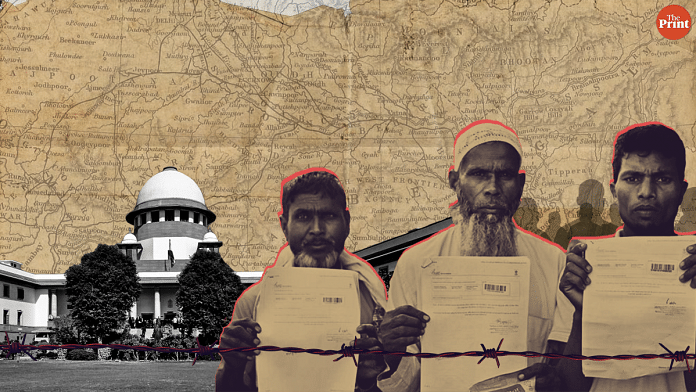The Citizenship Amendment Bill was passed in Lok Sabha Tuesday. The Bill seeks to provide citizenship to Hindus, Jains, Christians, Sikhs, Buddhists and Parsis from Bangladesh, Pakistan and Afghanistan who entered the country fleeing religious persecution before 31 December, 2014. Several opposition parties, including the Congress and even the northeast allies of the BJP, have opposed the Bill saying it is “against the fundamental aspects of the Indian Constitution”.
ThePrint asks: Citizenship Amendment Bill: Atoning for Partition or religion a criterion in secular India?
Proposed Bill can be called a revised version of the Akhand Bharat of Hindus thesis
 Hilal Ahmed
Hilal Ahmed
Associate professor, CSDS
The proposed amendment in the citizenship law goes against this spirit of the Constitution in two ways.
First, it aims to recognise the religion of a person as the prime marker of his/her identity to offer citizenship in the country. This emphasis on religion is highly problematic. The existing provisions of citizenship law employ secular categories. Even the term ‘migrated people’ is used for those Hindu/Sikh communities, who came to India in the wake of Partition.
Second, the identification of a ‘religious minority’ in a few Muslim majority states of South Asia is the second problem. Indian Constitution is primarily concerned with the territory of the Republic of India. It cannot be overstretched to recognise the ‘minority status’ of those communities, which do not reside on Indian territories.
These two technicalities, nevertheless, are inextricably linked to the Hindutva politics. The proposed law, in this sense, may be called a revised version of the Akhand Bharat of Hindus thesis. It is based on an assumption that Hindus are the ‘natural citizens’ of India, while Pakistan and Bangladesh are ‘Muslim homelands’. The deliberate exclusion of Muslims (who seek to apply for the Indian citizenship) from the list also underlines this aspect.
Govt has taken the right stand to protect persecuted Hindus
 Sangit Ragi
Sangit Ragi
Professor of Political Science, Delhi University
The Citizenship Amendment Bill passed by the Lok Sabha and being discussed in the Rajya Sabha has evoked many questions. One of them being – does it violate the tenets of secularism? I think this narrative is misplaced and driven by the hysterical secular-communal binary, which is often used in India to measure the value of any administrative decision.
The Bill proposes to give citizenship to the suppressed minorities coming into India from Muslim dominated states of Pakistan, Bangladesh and Afghanistan. Obviously, Muslims in the Muslim-dominated states are not the suffering minorities.
There are lakhs of Hindus, Buddhists and Jains who left these countries in order to escape religious persecution. And they are living in India without any citizenry rights under the Constitution. In Pakistan and Bangladesh, the Hindu population has been reduced to 0.7 and 8 per cent respectively.
These theocratic Islamic states have given almost no protection to Hindus and other minorities. India is the only country in the world where they look for shelter and support when persecuted, especially the Hindus and other Indic religionists. Therefore, the government stand is not just bona fide, but in the right direction towards protecting the persecuted Hindus.
Northeast is against Citizenship Amendment Bill because it ignores indigenous people
 Upamanyu Hazarika
Upamanyu Hazarika
Advocate and convenor of Prabajan Virodhi Manch- Forum Against Infiltration
As far as the northeast is concerned, our apprehensions are very specific in nature. What matters to us, at this point, are the rights of the ethnic and native northeasterners who have been burdened with over two decades of infiltration.
The influx of people from Bangladesh will convert us citizens into a minority – they already make up 25 per cent of the population. The Citizenship Bill makes our struggle tougher because it seeks to legitimise the illegal infiltration of Bangladeshis in the northeast.
The process of identification in the NRC has also been flawed. Lakhs of illegal Bangladeshi migrants figure in the NRC draft.
Independent studies in 2001 and 2011 concluded that ethnic Assamese citizens will become minorities in the next few decades, unless the infiltration is actively challenged.
The northeast is up in arms against the Citizenship Amendment Bill because it doesn’t care for the rights of the indigenous people. We also demand a redo of the NRC exercise, so that the illegal names that don’t belong on the list are removed. The government, instead of pushing for such a bill, should be disincentivising migrants from coming to India. They come to the country to safeguard their economic status, so if they are not permitted access to jobs and lands that would alleviate the problem.
Bill contradicts the Assam Accord and will also render NRC exercise meaningless
 Aman Wadud
Aman Wadud
Lawyer based in Guwahati
The Citizenship Amendment Bill fails the test of reasonable classification provided in Article 14 of the Constitution. Secularism is a part of the basic structure. The Bill is against the basic structure of the Constitution.
The Bill also contradicts the Assam Accord, which fixed the cut-off date for citizenship as 24 March 1971. According to the Assam Accord, any illegal migrant, irrespective of religion, shall be detected and deported. Therefore, the Bill will nullify the Assam Accord.
The current update of the National Register of Citizens (NRC) will also be rendered meaningless if a section of illegal migrants who are left out of the list are granted citizenship based on religion.
There have been massive protests and outrage against the Bill in Assam and the BJP has nothing to defend itself with except saying that the Bill will stop Badruddin Ajmal from becoming the chief minister of Assam. Ironically, the BJP is using this as a defense at a time when Ajmal is fast losing ground among Muslims.
On the day the Bill was passed in Lok Sabha, Himanta Biswa Sarma, BJP’s face in the northeast, said that the Bill is to protect 17 assembly seats where “Bengali Hindus” constitute 10 thousand of the votes, and it will keep Jinnah/Badruddin Ajmal away and elect Assamese leaders. His statement contradicts the very objective of the Bill, which is to provide relief to persecuted migrants. Hence, there is no doubt that this Bill is a fraud and won’t pass the test of constitutionality.
By Fatima Khan, journalist at ThePrint. You can follow her @khanthefatima.



